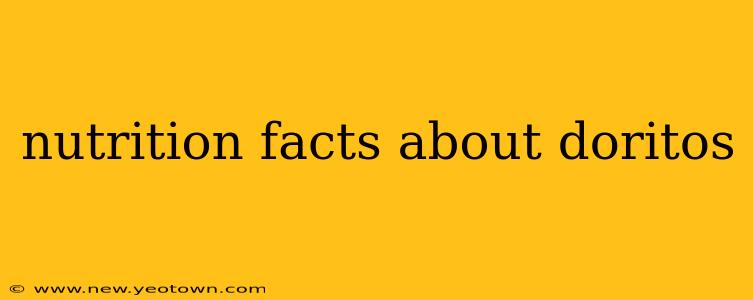Doritos. The name conjures images of vibrant colors, bold flavors, and that irresistible crunch. But behind the satisfying snack lies a nutritional profile that's worth understanding. This isn't just about calories; it's about making informed choices and enjoying your favorite snacks responsibly. Let's unravel the nutritional facts of this popular chip, tackling some frequently asked questions along the way.
What are the main ingredients in Doritos?
The exact ingredients vary slightly depending on the flavor, but generally, Doritos contain corn, vegetable oil (typically a blend of corn, sunflower, and/or soybean oil), cheese powder (maltodextrin, cheddar cheese, whey, romano cheese, salt, etc.), and seasonings. This seemingly simple list belies the complex flavor profiles achieved through a careful blend of spices, natural and artificial flavors, and other additives. The precise makeup of the cheese powder is often a proprietary blend, contributing to the unique taste of each variety. One thing to note is that many Doritos varieties contain artificial colors and preservatives to maintain their vibrant appearance and extend shelf life.
How many calories are in a serving of Doritos?
This is where things get interesting. A "serving" is typically defined as about 1 ounce (approximately 28 grams), which equates to roughly 140-160 calories depending on the specific flavor. However, let's be honest: how many of us stick to just one serving? A larger handful, a whole bag—it's easy to consume far more than the stated serving size, significantly increasing the calorie count. The calorie density of Doritos, like many processed snacks, is relatively high, meaning a small amount packs a substantial number of calories.
How much sodium is in Doritos?
Sodium content is another key area of concern. A single serving often contains a significant portion of the recommended daily sodium intake. The high sodium content is mainly attributed to the salt and cheese powder in the recipe. For individuals watching their sodium intake due to health concerns like high blood pressure, this should be a factor in their snack choices. Regular consumption of high-sodium foods can contribute to various health problems, so moderation is key.
What are the fats and carbohydrates in Doritos?
Doritos are primarily composed of carbohydrates, largely stemming from the corn base. They are also a source of fat, mainly from the vegetable oils used in the manufacturing process. The type of fat is predominantly unsaturated, which is generally considered healthier than saturated fat. However, the overall quantity of fat should be considered when incorporating Doritos into a balanced diet. The combination of carbohydrates and fats contributes significantly to the calorie content.
Are Doritos gluten-free?
This depends on the specific variety and manufacturing processes. While the primary ingredient, corn, is naturally gluten-free, there's always a risk of cross-contamination during production. It’s advisable to always check the packaging for allergen information, as Doritos are produced in facilities that may also process gluten-containing products. Individuals with celiac disease or gluten sensitivity should exercise caution and verify the gluten-free status of specific Doritos products before consuming them.
Are there any health benefits to eating Doritos?
Let's be realistic: Doritos are not a health food. They're not a significant source of vitamins, minerals, or essential nutrients. However, moderation is key. Enjoying them as an occasional treat, as part of a balanced diet, isn't likely to cause significant harm. The focus should always be on overall dietary habits and ensuring a diverse intake of nutrient-rich foods.
Conclusion: Enjoy in Moderation
Doritos, like most processed snacks, should be consumed in moderation. Understanding the nutritional profile—the calories, sodium, fats, and carbohydrates—allows for informed choices. While not inherently "bad," they shouldn't form a major part of a healthy diet. Consider them an occasional indulgence, savored consciously and incorporated into a broader dietary plan that prioritizes whole foods and nutritional balance.

